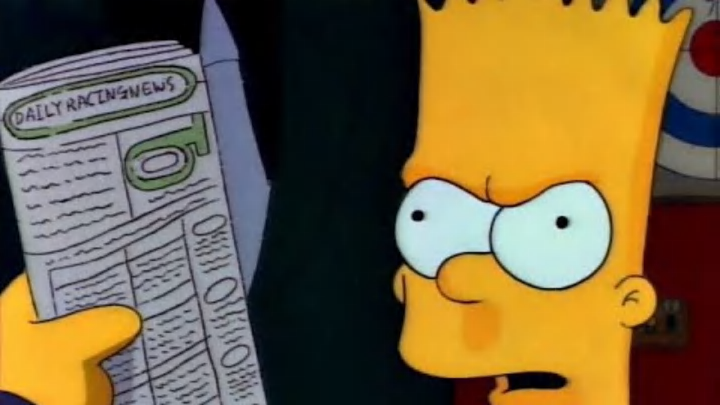When The Simpsons debuted in December 1989, it became an instant sensation, drawing an average of 27.8 million enraptured viewers to Fox every Sunday night during its first season. While there was (and remains) a lot to appreciate about the show, viewers quickly came to love and identify with Bart, the family’s spiky-haired oldest child. A skateboarding hellion who’s never met a prank call he didn’t want to make, Bart is part class clown and part problem child, with a razor-sharp wit and little respect for authority.
And starting with the show’s second episode, Bart’s anti-establishment ire got its own catchphrase: Eat my shorts. For all intents and purposes, it’s just a way to tell someone to buzz off (like a cheeky version of kiss my ass). Originally ad-libbed during a cast table read by Nancy Cartwright, the actor who voices Bart, it was a phrase she remembered from her days in the Fairmont High School marching band in the early to mid-‘70s. According to her, they’d sometimes chant it in lieu of the phrase Fairmont West.
Though The Simpsons wasn’t the first time Eat my shorts appeared on TV or in a movie—Bender slings it at the principal in The Breakfast Club, and it’s used in both 1986’s Maximum Overdrive and 1981’s Body Heat—the show revitalized it. The show’s marketing team throwing the euphemism on everything from t-shirts to boxers and even breakfast cereal. (Indeed, it became so synonymous with Bart that, years later, the show’s writers actually stopped using it, saying it had become too worn out.)
Schools Have a Cow, Man
All that merch sold like hotcakes but also sparked a significant backlash. Starting in the ‘90s, schools across the United States began to ban Bart Simpson apparel, claiming that shirts that said things like “Eat my shorts,” “I’m Bart Simpson. Who the hell are you?,” and “Underachiever and proud of it” were disrespectful and distracting. In 1990, an elementary school principal from Fremont, Ohio, told the Deseret News, “We strive for excellence and to instill good values in kids,” adding that the show “teaches the wrong thing to students.” Administrators suggested that these shirts were obscene and that wearing them to school was inappropriate.
The effect of the bans was even felt in the retail world: JCPenney bowed to social pressure and pulled the apparel from its racks, but the hype around the shirts had a buoying effect elsewhere, with an estimated 15 million Simpsons shirts sold in 1990 alone.
Some school officials even argued against the bans for this reason. “By not paying attention to [the controversy] at all, it just kind of disappears,” said Stan Rachowicz, a counselor at McKinley Junior High in South Holland, Michigan. Barbara Hall, a spokesperson for Brookwood Junior High School in Glenwood, Illinois, agreed. “Sometimes,” she claimed, “all this publicity causes more attention and makes students want to wear something more.”
The controversy certainly didn’t affect the show’s overall popularity; new episodes are still airing to this day, almost 35 years later. Simpsons creator Matt Groening said he had “no comment” about the shirt bans at the time, adding, “My folks taught me to respect elementary school principals, even the ones who have nothing better to do than tell kids what to wear.”
Discover More Fascinating Phrase Origins:
